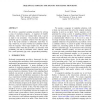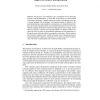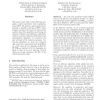1204 search results - page 49 / 241 » Termination of Polynomial Programs |
WSC
2007
15 years 3 months ago
2007
We develop a sequential sampling procedure for solving a class of stochastic programs. A sequence of feasible solutions, with at least one optimal limit point, is given as input t...
117
Voted
ESOP
2010
Springer
15 years 10 months ago
2010
Springer
In search for a foundational framework for reasoning about observable behavior of programs that may not terminate, we have previously devised a trace-based big-step semantics for W...
118
Voted
SOFSEM
2010
Springer
15 years 9 months ago
2010
Springer
We present a new technique to prove termination of Term Rewriting Systems, with full automation. A crucial task in this context is to find suitable well-founded orderings. A popul...
126
click to vote
CAV
2001
Springer
15 years 4 months ago
2001
Springer
We consider the randomized consensus protocol of Aspnes and Herlihy for achieving agreement among N asynchronous processes that communicate via read/write shared registers. The alg...
106
click to vote
COLT
1992
Springer
15 years 4 months ago
1992
Springer
This paper deals with a class of Prolog programs, called context-free term transformations (CFT). We present a polynomial time algorithm to identify a subclass of CFT, whose progr...



